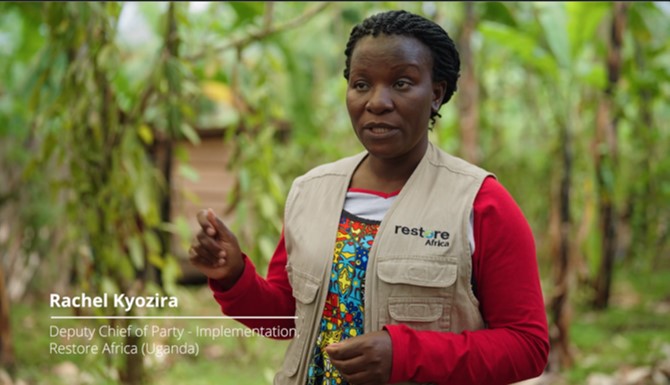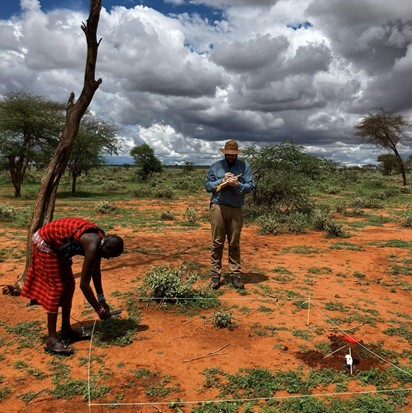Thought leadership
- Date 16 October 2024
- Words by Viviana Lujan Gallegos
- Reading time 2 mins
World Food Day 16 October
The theme for this year’s UN FAO World Food Day is “Right to foods for a better life and a better future.”

The world’s farmers produce more than enough food to feed the growing global population, yet it is estimated that more than 700 million people in the world continue to suffer from hunger.
And while food production and agriculture play a critical role in feeding the world, they can create negative impacts on the environment. According to most estimates, around half of the world’s habitable land (land that is neither desert nor ice) is used for agriculture, while food production and agriculture account for over a quarter of all greenhouse gas emissions and consume over two thirds of the world’s freshwater.
“ Our aim is to invest in natural capital projects that can reverse the negative spiral of biodiversity loss, water contamination, chemical reliance, soil degradation and climate change”
At Climate Asset Management, we see nature as the most fundamental form of capital so the protection, conservation and restoration of nature is a priority for our projects. Our investment strategies aim to work across landscapes to build resilience whilst generating returns from food and fibre products or environmental commodities. That resilience means in many cases delivering greater food security for local communities as well as jobs and improved livelihoods.
For decades, unsustainable attitudes towards land use and land management have led to climate change, catastrophic declines in biodiversity, and the destruction of nature.
The IPCC estimates that soil alone has the capacity to sequester enough CO2 to cover more than four years of global greenhouse gas emissions.
To date we have raised more than $1 billion from institutional and corporate investors, to invest in large scale natural capital projects around the world that aim to generate returns for investors and nature – enhancing ecosystems, protecting biodiversity and accelerating the transition to net zero.
Two of our large scale landscape restoration projects funded by our Nature Based Carbon Fund are in sub-Saharan Africa, where we are aiming to restore approximately two million hectares of degraded land (that’s an area almost the size of Wales).
Our first project, the Restore Africa Programme, is a partnership with the Global Evergreening Alliance which will see the restoration of a land area at scale in three countries, and transform farmer practices from predominantly mono-cropping towards agroforestry projects that combine planting of for example multipurpose trees (fruit and nuts) with annual (cash) crops (like vanilla) and livestock.

The programme is targeting to cover up to one million hectares in Kenya, Uganda and Malawi, where we will be working with around one million small holder farming families to adopt sustainable farming practices and farmed managed natural regeneration (FMNR) to deliver greater resilience and food security for their communities.
“ These two projects aim to improve the food security and livelihoods for several million people across sub-Saharan Africa.”

Our second project is in southern Kenya, where with our partners Soils of the Future Africa, we are working with the Maasai community to reintroduce rapid rotation grazing (RRG) practices across approximately one million hectares, working with 25 community groups and promoting assisted natural regeneration of grasslands. RRG is actually a return to the traditional Maasai grazing methods. Positive impacts are focused on climate and biodiversity by removing CO2e from the atmosphere through the restoration of perennial grasses and soil that can more effectively retain water leading to increasing productivity and cover, supporting wildlife populations.
And while the local communities here will also benefit from shared revenues from the carbon finance, the focus of the projects is to create a sustainable landscape that will increase resilience, livestock quality and its market price, and improve biodiversity, which together will enhance livelihoods for the local communities.
These two projects aim to improve the food security and livelihoods for several million people across sub-Saharan Africa.
Greater food security is as much about quality over quantity. The emphasis of both projects is on producing higher quality and more nourishing food, for example healthier cattle can produce nourishing milk for children on a daily basis rather than for one or two days a week, and healthier cattle produce higher quality of meat, so farmers, their families and communities benefit from this virtuous cycle.
With the help of our investors we are hoping to create one of those rare win-win-win opportunities: by improving the livelihoods and food security of the communities where our Funds invest in sustainable land-use management activities; by helping organisations with net zero commitments to deliver on their climate pledges through supporting investments on nature-based solutions projects; and ultimately by creating a more climate resilient world for generations to come.

